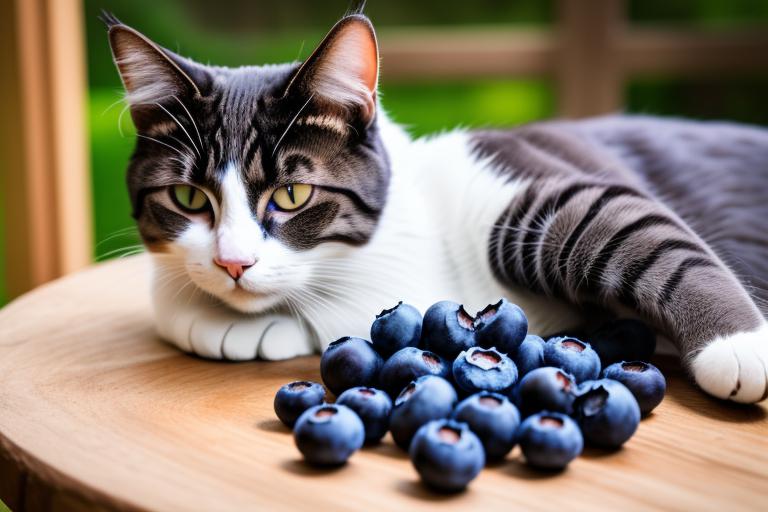Are you curious about what your feline friend can and cannot eat? Well, prepare to be amazed because when it comes to blueberries, the possibilities might just blow your mind.
But before you rush off to share a bowl of these juicy, vibrant fruits with your cat, let’s take a closer look at whether or not cats can actually eat blueberries. Trust us, the answer might surprise you.
Nutritional Value of Blueberries for Cats
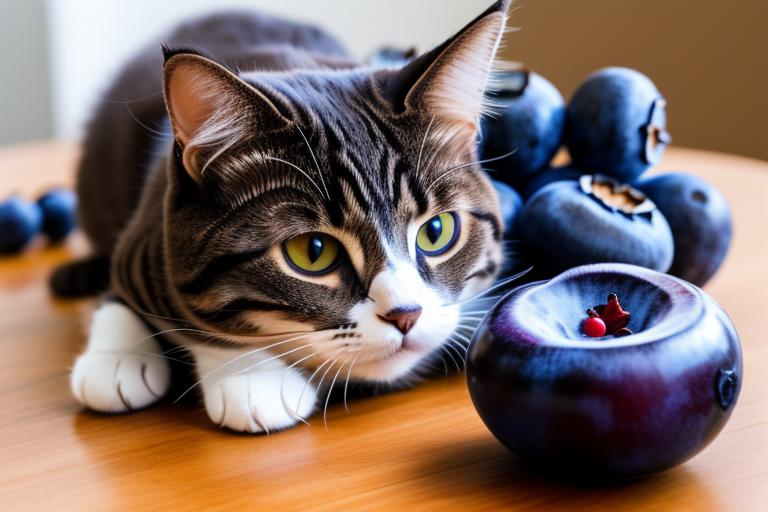
Blueberries are a nutritious addition to your cat’s diet. They’re packed with essential vitamins and minerals that can benefit your feline friend’s overall health. However, it’s important to note that just like humans, cats can have potential allergies to certain foods, including blueberries. If you notice any signs of allergies in your cat, such as vomiting, diarrhea, or excessive itching, it’s best to avoid feeding them blueberries and consult with your veterinarian.
If your cat is allergic to blueberries or you simply want to offer them alternative fruits, there are other options available. Some cats enjoy small portions of fruits like watermelon, cantaloupe, or bananas. However, it’s crucial to remember that fruits should only be given as occasional treats and not as a substitute for a balanced cat food diet. Fruits should make up only a small portion of your cat’s overall diet, as they’re primarily obligate carnivores and require a diet rich in animal protein.
Always introduce new foods gradually to your cat’s diet and observe for any adverse reactions. While blueberries can provide some nutritional benefits, it’s important to prioritize your cat’s dietary needs and consult with your veterinarian before making any significant changes to their diet.
Potential Health Benefits of Feeding Cats Blueberries
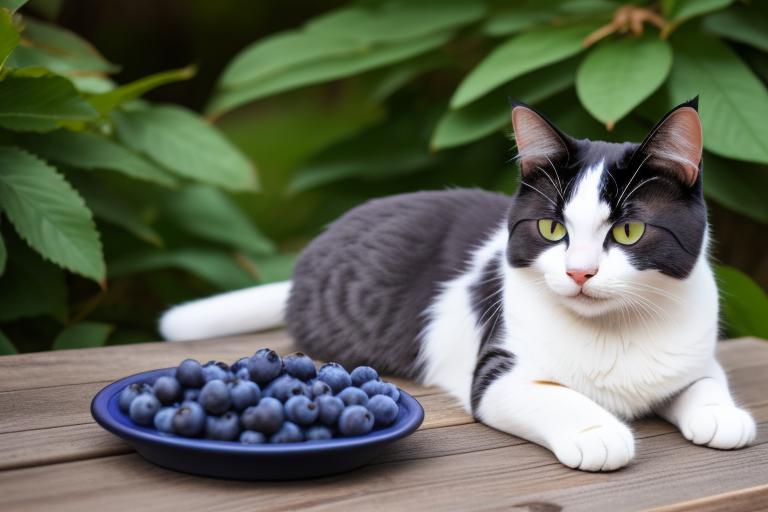
Feeding your cat blueberries can potentially provide them with a variety of health benefits. While there are no specific studies on the effects of blueberries on cats, they’re known to be rich in antioxidants, vitamins, and minerals that can support overall health. Blueberries are packed with antioxidants, such as vitamin C and anthocyanins, which can help boost the immune system and protect against cell damage. These antioxidants may also have anti-inflammatory properties, which can be beneficial for cats with certain health conditions. Additionally, blueberries are a good source of fiber, which can aid in digestion and promote healthy bowel movements.
However, it’s important to note that not all cats may tolerate blueberries well. Some cats may experience digestive upset, such as vomiting or diarrhea, if they eat too many blueberries. It’s always best to introduce new foods gradually and in small amounts to monitor your cat’s reaction. If your cat experiences any adverse effects, it’s best to discontinue feeding them blueberries.
If you’re concerned about the health risks of feeding your cat blueberries or if your cat doesn’t enjoy them, there are other alternative fruits that can provide similar health benefits. For example, you can try feeding your cat small pieces of sliced apples, bananas, or even melons. Just be sure to remove any seeds or pits and introduce these fruits slowly to avoid any digestive issues.
Can Cats Digest Blueberries?
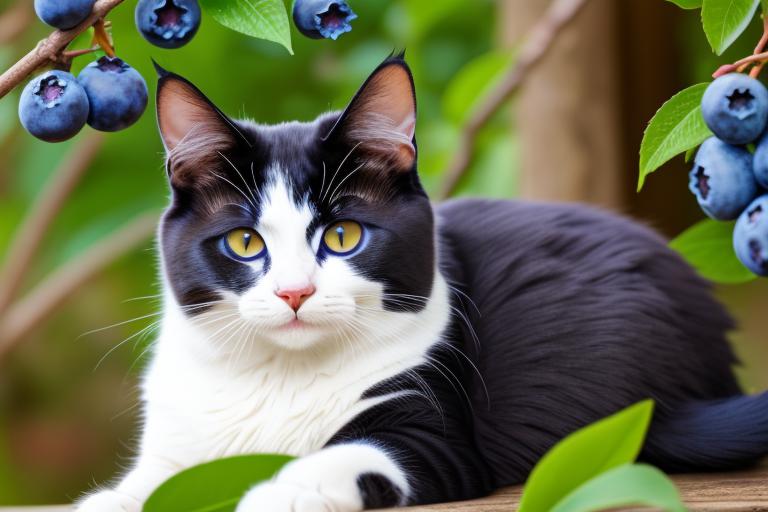
Cats can easily digest blueberries due to their natural enzymes and digestive system. The digestion process in cats starts in the mouth, where they begin to break down the food by chewing. Once the blueberries reach the stomach, they’re further broken down by stomach acids and enzymes. These enzymes help to break down the carbohydrates and sugars present in the blueberries, allowing the nutrients to be absorbed by the cat’s body.
The effects of blueberries on a cat’s stool can vary. Since blueberries are high in fiber, they can help regulate a cat’s bowel movements and prevent constipation. The fiber in blueberries adds bulk to the stool, making it easier for the cat to pass. On the other hand, if a cat eats too many blueberries, it can lead to loose stools or diarrhea. It’s important to introduce blueberries gradually into your cat’s diet and monitor their reactions.
Precautions When Feeding Cats Blueberries
Before introducing blueberries into your cat’s diet, it’s important to take certain precautions. While blueberries can be a healthy snack for cats in moderation, feeding them too many can pose potential risks. One of the main concerns is the high sugar content in blueberries. Cats are obligate carnivores and their bodies aren’t designed to process large quantities of sugar. Consuming excessive amounts of blueberries can lead to weight gain, diabetes, and other health issues.
To monitor your cat’s reaction to blueberries, start by introducing small amounts as a treat and observe how they respond. Look for any signs of gastrointestinal upset, such as vomiting or diarrhea. If your cat shows any negative reactions, it’s best to discontinue feeding them blueberries.
Additionally, keep in mind that some cats may have allergies or sensitivities to certain foods, including blueberries. If you notice any unusual symptoms, such as itching, swelling, or difficulty breathing, seek veterinary attention immediately.
How to Safely Introduce Blueberries Into a Cat’s Diet
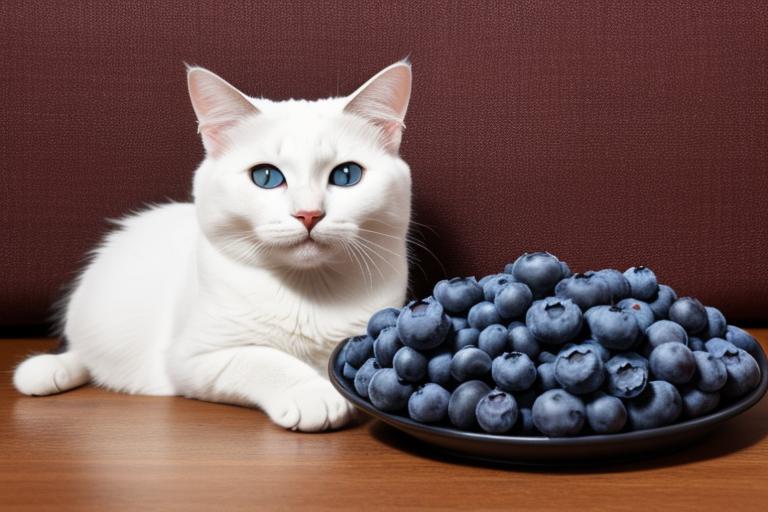
To safely introduce blueberries into your cat’s diet, start by gradually incorporating small amounts as a treat. Here are some tips to help you introduce blueberries to your feline friend:
- Start with a small portion: Begin by offering your cat a single blueberry as a treat. Observe their reaction and look for any signs of allergies or digestive issues.
- Monitor for allergies: Keep an eye out for any allergic reactions such as itching, swelling, or difficulty breathing. If your cat shows any signs of an allergic reaction, discontinue feeding them blueberries immediately.
- Introduce slowly: After the initial trial, you can gradually increase the portion size of blueberries, but do so slowly to allow your cat’s digestive system to adjust.
- Mix with their regular food: Consider mixing a few mashed blueberries into your cat’s regular food to help them get used to the taste and texture.
- Moderation is key: Blueberries should only be given to your cat as an occasional treat. While they’re generally safe for cats, too many can cause digestive issues due to their high fiber content.
Frequently Asked Questions
Blueberries can be a safe and nutritious addition to your kitten’s diet. They are a good source of vitamins and can be included in a balanced diet for kittens.
Feeding your cat blueberries can help prevent urinary tract infections. Blueberries have antioxidants and anti-inflammatory properties that can benefit your cat’s urinary health.
Blueberries won’t make your cat gain weight. They can actually be a healthy addition to their diet. Just make sure to feed them in moderation as part of a balanced feline weight management plan.
Feeding your cat blueberries may have potential risks and side effects. Some cats may be allergic to blueberries, which can cause digestive issues. It’s important to monitor your cat’s reaction and consult with a veterinarian.
To introduce blueberries into your cat’s diet, start with small servings and observe any adverse reactions. Blueberries can provide nutritional benefits like antioxidants and fiber, but moderation is key.
Conclusion
So, can cats eat blueberries?
While blueberries can be a healthy and tasty treat for cats, it’s important to remember that they should only be given in moderation.
Blueberries can provide cats with essential nutrients and potential health benefits, but it’s crucial to introduce them slowly and watch for any adverse reactions.
As with any new food, it’s always best to consult with a veterinarian before making any changes to your cat’s diet.

